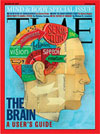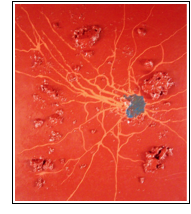La plasticité du cerveau
 La recherche sur le cerveau progresse plus rapidement que la capacité de l’éducation à modifier ses pratiques. Le dernier numéro du magazine Time contient un formidable dossier sur l’état actuel de nos connaissances sur le cerveau. Le fait le plus extraordinaire serait cette capacité du cerveau à modifier sa propre structure (Time: How The Brain Rewires Itself). On y arrive également par la pensée, mieux certainement qu’Uri Geller. Le cerveau, en résumé, est doté d’une plasticité neuronale (neuroplasticity). Comme le fait judicieusement remarquer Geogre Siemens, on n’a pas fini de s’interroger sur la relation entre le cerveau et les nouvelles technologies.
La recherche sur le cerveau progresse plus rapidement que la capacité de l’éducation à modifier ses pratiques. Le dernier numéro du magazine Time contient un formidable dossier sur l’état actuel de nos connaissances sur le cerveau. Le fait le plus extraordinaire serait cette capacité du cerveau à modifier sa propre structure (Time: How The Brain Rewires Itself). On y arrive également par la pensée, mieux certainement qu’Uri Geller. Le cerveau, en résumé, est doté d’une plasticité neuronale (neuroplasticity). Comme le fait judicieusement remarquer Geogre Siemens, on n’a pas fini de s’interroger sur la relation entre le cerveau et les nouvelles technologies.
If our thoughts change – or literally, rewire – our brain, imagine the impact of new tools and technology. How are we, and our students, impacted by information abundance? Blogs? Podcasts? Games and simulation? Video? New technology?
Les éléments du dossier :
How The Brain Rewires Itself: Not only can the brain learn new tricks, but it can also change its structure and function–even in old age
The Mystery of Consciousness: You exist, right? Prove it. How 100 billion jabbering neurons create the knowledge–or illusion–that you’re here
Time Travel in the Brain: What are you doing when you aren’t doing anything at all?
6 Lessons for Handling Stress: Take a deep breath. Now exhale slowly. You’ve just taken the first step toward managing stress and avoiding burnout
What Do Babies Know?: Babies have to learn everything, but as Piaget was saying, they start with a few primitive reflexes that get things going
How We Make Life-and-Death Decisions: In the up-close-and-personal scenario the emotions are usually strong enough to win
The Flavor Of Memories: Any kind of emotional experience will create a stronger memory
Markiteing To Your Mind: We can use brain imaging to gain insight into the mechanisms behind people’s decisions
The Power of Hope: What woke my patient that Friday was simply his mind, forcing its way through a broken brain, a father’s final act to comfort his family
Who Should Reead Your Mind?: the exploding new field of neuroethics, the study of the ethical and philosophical dilemmas provoked by advances in brain science
How To Change A Personality: future pharmaceuticals, targeting very specific parts of the brain, will be even more effective and will have fewer side effects
What The Mouse Brain Tells Us: the mouse brain can be a powerful tool for unraveling the mystery of human mental disorders
The Gift Of Mimicry: Do areas of gray matter respond to the emotional contours of speech produced by others in the same way they do when we ourselves are speaking?
Five Paths to Understanding the Brain: une présentation interactive de notre compréhension du cerveau au fil du temps.
Les vidéos (utilisateurs Mac : j’ai eu plus de succès avec Firefox que Safari) :
Mysteries of Conciousness: Sarah Scantlin is a living medical miracle. An accident injured her brain so severely she should have died, but 20 years later she has regained the ability to speak
Exercise Your Brain: Dr. Sanjay Gupta tells us how we can keep our memory as we age and even create new brain cells through mental and physical exercise
A Look Inside A Baby’s Brain
How Your Brain Handles Stress
Blind Learn To See With Tongue
Par ricochet :
La robotisation du cerveau
Impact des jouets sur le cerveau
Imitation neuronale
Différences de cerveau entre les sexes
Un deuxième cerveau
Le cerveau des enfants doués se développe autrement
Les effets de l’alcool sur le cerveau des jeunes
La lecture bombarde le cerveau
Avantage Q.I. masculin (et cerveau d’ado)
Étude : la musique favorise le développement du cerveau
Vous pouvez suivre les commentaires en réponse à ce billet avec le RSS 2.0 Vous pouvez laisser une réponse, ou trackback.









Tres bonne couverture par le times. Souvent les presses grands tirages ne font pas un aussi bon travail !
Je suis un abonné de longue date du magazine Time. J’ai toujours apprécié leurs reportages scientifiques qui reposent les avis des meilleurs experts.
En lisant la revue aujourd’hui, je suis tombé sur un autre article intéressant pour l’éducation et la psychologie : The Overscheduled Child Myth. Contrairement à ce que plusieurs pensent, il semble que les jeunes n’ont aucune difficulté à composer avec des journées d’activité bien remplies.
« … on n’a pas fini de s’interroger sur la relation entre le cerveau et les nouvelles technologies. »
Personnellement je comprends mieux mon comportement dans la réponse de Michel Serres donnée dans cette conférence :
Les nouvelles technologies, que nous apportent-elles ?
Bien que je trouvais pas la présentation passionnante au début il y a eu comme un grand « TILT » lorsqu’il a décrit l’ ‘externalisation des fonctions cognitves ». Je trouve cette approche très intéressante.
Il y a aussi un mp3 pour les adeptes du M-learning
La présentation de Michel Serres est l’une des meilleures qu’il m’a été donné d’entendre. Ça m’a beaucoup éclairé sur le rôle des TIC en éducation. Cette vidéo doit absolument être vue par tous les enseignants, présents et futurs. Par ailleurs, je trouve que cette idée « externalisation des fonctions cognitives » rejoint le connectivisme.